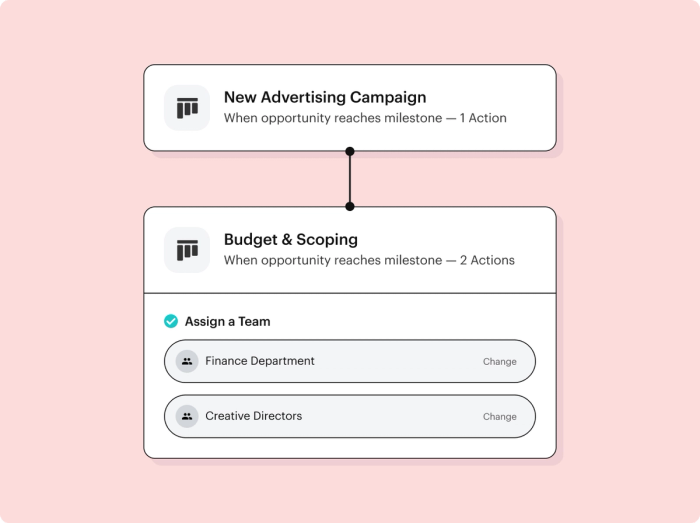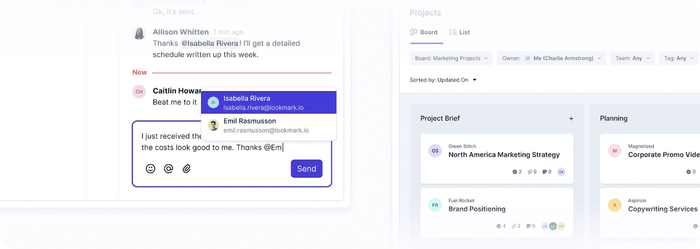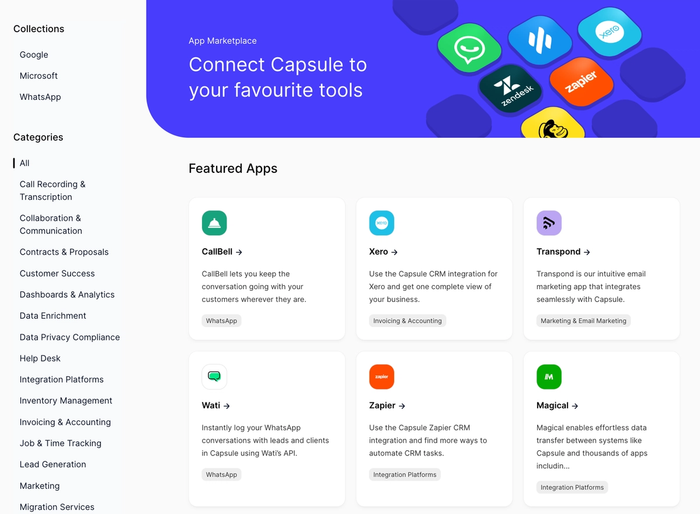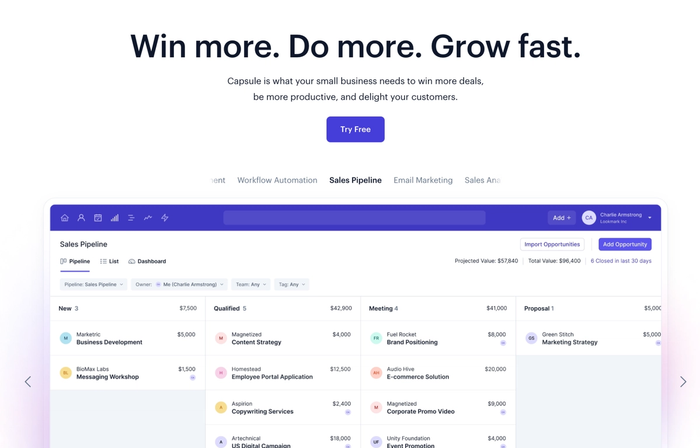What if the endless admin tasks, lost client opportunities, and sleepless nights over policy renewals could disappear? As an insurance agent, you’re juggling complex policies, chasing leads, and keeping customers satisfied – all while fighting the clock.
The stress of manually entering data and struggling with disorganized systems only adds to the chaos.
Insurance CRM software is here to change that. It simplifies your day-to-day operations, helping you focus on what you do best: selling and building client relationships.
In this guide, we’ll explore CRM for insurance agents – its benefits to your insurance agency, and the features to prioritize.
What is insurance CRM software?
Insurance CRM software helps agents and brokers manage client relationships, policies, and sales. It organizes client data, automates reminders for renewals, and tracks claims in real time. Agents can focus on selling while the CRM handles and automates admin tasks, for example:
- Insurance companies can track client claims and provide real-time updates to improve customer experience.
- Agencies can use CRM tools to send automated renewal reminders.
- Insurance brokers can organize and prioritize leads in their sales pipeline.
- Teams can manage customer support requests through live chat or email.
Key features to look for in CRM for insurance
#1 Lead and client management
Relying on spreadsheets for lead management? That’s why prospects fall through the cracks. Spreadsheets can’t track customer data in real time or help you act quickly when prospects show interest. A CRM system solves this problem by providing tools for the insurance industry's unique needs.

For insurance brokers, a CRM platform assigns leads to the right agent based on policy type or region. It shows where each lead is in the sales process and flags opportunities for action.
If a prospect requests a quote, the CRM immediately notifies the right team member to follow up.
You should look for a solution that allows you to customize lead assignments based on your agency's processes. The CRM should provide real-time updates on lead status, ensuring no opportunity is missed.
#2 Policy and claims management
Policies and claims are at the heart of the insurance business. Brokers need quick access to client information and processes at all times.
However, managing policies and claims manually leads to delays and dissatisfied clients. A CRM for insurance brokers should provide centralized access to policy details and real-time claims tracking,
There are two key features to look for:
- Policy management tools. Store coverage details, start/end dates, and premiums in one place to simplify updates for insurance agencies.
- Claims tracking. Monitor claim statuses and automate updates for clients to reduce bottlenecks and improve customer retention.
#3 Renewal tracking and reminders
Imagine a long-term client misses their policy renewal because the agent forgot to follow up. The client could then switch to another insurance company, and your agency loses revenue and a trusted customer relationship. Not quite ideal, is it?
A CRM insurance solution ensures this never happens. For insurance agencies, automated notifications for both agents and clients are essential to prevent lapses in coverage.
This feature is especially critical for high-value policies or time-sensitive renewals.
#4 Sales and marketing automation
Insurance agents don’t just sell policies – they constantly promote services, follow up with clients, and keep leads warm. Manually managing these tasks eats up time that could be spent closing deals. A CRM insurance solution takes over mundane tasks.

Agents could leverage:
- Lead generation campaigns. Use the CRM to send targeted emails or SMS to prospects. For example, set up a campaign to notify clients about life insurance promotions or policy upgrades – so they stay engaged without constant manual effort.
- Instant follow-ups. When a prospect requests a quote, the CRM automatically assigns it to the right agent and schedules a follow-up call. This ensures no lead goes cold while you’re busy with other sales activities.
- Optimized workflows. The right customer relationship management system should automate tasks based on client actions. When a policy renewal date approaches, the CRM emails the client, updates your to-do list, and alerts your team if no action is taken.
#5 Analytics and reporting
What if you knew exactly which leads convert, which policies perform best, and how satisfied your clients really are? With the right CRM system, you don’t have to guess.

Built-in analytics give insurance brokers real-time insights to track sales performance, client behavior, and even policy trends – all from customizable dashboards.
Key sales metrics to track:
- Lead conversion rate. Measures how effectively you turn prospects into clients. A healthy benchmark for the insurance industry is around 10-15%.
- Policy renewal rate. Tracks the percentage of clients renewing their policies. Aim for at least 80% to maintain consistent revenue and customer retention. If renewals drop below that point, automate reminders and offer incentives.
- Average time to close. Calculates how long it takes to close a sale. Shorter times indicate efficient processes; under 30 days is ideal for most insurance brokers.
- Customer satisfaction score (CSAT). Gauges how satisfied clients are with your service. Scores above 80% usually mean strong customer relationships.
- Claims resolution time. Tracks how quickly claims are processed. Faster resolutions (within 7-10 days) lead to better customer satisfaction.
- Cross-sell and upsell rates. Measures how often agents successfully sell additional policies to existing clients. High rates indicate effective customer relationship management.
- Agent productivity. Tracks individual or team performance, such as the number of leads followed up daily. Benchmarks vary but monitoring trends helps identify top performers.
With CRM analytics, you can turn data into actionable strategies that improve performance and keep your clients happy.
#6 Mobile accessibility
For some industries, mobile accessibility in a CRM system is a bonus, not a necessity. But for insurance agents, it’s critical.
Agents often work in the field, meeting clients, assessing claims, and pitching policies. The ability to access and update CRM data in real time can mean the difference between closing a deal and losing a lead.
Imagine an agent visiting a potential client to discuss home insurance. With mobile CRM access, they can pull up policy options, update client information, and schedule a follow-up before leaving the sales meeting.
The client feels valued, and the sales process moves forward instantly.
Now, picture the same scenario without mobile access. The agent scribbles notes on paper, forgets a few key details, and delays entering the data until they return to the office. By then, the lead grows cold, or worse, a competitor swoops in with a faster response.
A CRM with mobile functionality ensures agents stay responsive and proactive – no matter where they are.
#7 Team collaboration
In the insurance industry, team collaboration is critical to avoid missteps like multiple agents pitching to the same client or missing follow-ups entirely. A CRM system with real-time updates ensures every team member works from the same page.

For instance, an agent visiting a client can update their CRM with notes about the conversation while still on-site. Back at the office, another team member sees the update and avoids contacting the same client unnecessarily.
Without such a system, the field agent might delay updating client information, leaving others unaware of the latest developments. This could lead to duplicate pitches and many missed opportunities.
#8 Document management
For insurance agents, handling documents is an unavoidable part of the job. Policies, claims forms, agreements, and supporting documents must all be organized and easily accessible. A CRM system with document management ensures everything is stored securely and retrieved instantly when needed.
This feature eliminates the risk of losing important paperwork or misfiling critical client information. It also reduces reliance on physical storage – allowing agents to focus on serving clients rather than tracking down misplaced forms.
With a CRM system, documents are always at your fingertips, whether you’re updating a policy, processing a claim, or preparing for client meetings.
#9 Compliance tools
Insurance agents handle highly sensitive data – policy details, medical histories, and financial information. A single mishap can lead to fines, audits, and a tarnished reputation. From managing individual policies to overseeing complex corporate accounts, secure data management is critical at every level of the insurance industry.
CRM systems designed for the insurance industry should offer tools like end-to-end encryption and access controls. For example, only authorized team members should access certain client information, ensuring confidentiality at all times. Audit trails keep track of every action, providing proof of compliance if regulators come knocking.
When compliance features are built into your CRM, you can confidently store, update, and retrieve client data while staying aligned with GDPR, HIPAA, and other regulations.
#10 Customizability
A CRM is like an insurance policy – one size never fits all. Just as clients need policies tailored to their unique situations, brokers need a CRM system that adapts to their specific workflows, not the other way around.
With so many brokers managing diverse claims and jurisdictions, the best CRM for insurance must offer seamless customization without becoming overwhelming.
Agents need the ability to set up tailored workflows that align with their processes – whether they’re handling renewals, tracking claims, or following leads.
An overly rigid CRM limits efficiency, but a complex system can be frustrating to manage. The right solution strikes the balance – flexible enough to adjust to your needs, and simple enough to implement without a hassle.
#11 Integrations
A CRM is only as powerful as the ecosystem it operates within. For insurance brokers and agencies, the CRM must work with existing tools – accounting software, email marketing platforms, or live chat solutions.

Insurance professionals rely on multiple tools to manage policies, communicate with clients, and track finances. A CRM that integrates these systems ensures everything works in harmony!
For example, syncing email marketing with your CRM allows you to track responses to campaigns or follow-ups automatically. Integration with accounting software streamlines premium tracking and payment updates. When tools work together, it eliminates data silos and creates a unified workflow.
The best CRM doesn’t force you to replace what already works. It fits into your processes, simplifying the way you manage your business.
Capsule CRM – ticking all the boxes
We get it – there’s a lot to consider when choosing the perfect CRM for your insurance business. Lead management, policy tracking, sales automation, compliance tools, integrations... it feels like an endless list. But what if one tool could handle it all? That’s where Capsule CRM steps in.

What is Capsule CRM?
Capsule CRM combines simplicity with power – offering exactly what insurance brokers and agencies need without overwhelming them with unnecessary complexity. Whether you're managing leads, tracking claims, or automating follow-ups, Capsule does it all!
- Lead and deal management: Easily track prospects and move deals through a visual sales pipeline. You’ll never lose sight of where your opportunities are or what needs your attention.
- Policy and client tracking: Keep all customer data in one place. Capsule ensures you can instantly retrieve client information and maintain a clear view of your customer relationships.
- Automation to save time: From sending renewal reminders to creating workflows for claims management, Capsule takes the busywork off your plate so you can focus on closing deals.
- Seamless integrations: Connect with the tools you already use – G Suite, QuickBooks, Xero, and Mailchimp – to create a streamlined, efficient workflow. Capsule fits into your system.
- Customizable reports: Want to see which policies are performing best or how your agents are closing deals? Capsule’s reporting tools let you tailor analytics.
What makes Capsule different for insurance agents?
Unlike bulky CRMs that overwhelm you with endless features you’ll never use, Capsule is laser-focused on what insurance professionals actually need. Its intuitive design means you and your team can get started right away without weeks of training or onboarding.
Capsule also grows with you. Whether you’re a solopreneur broker or an established agency, Capsule’s affordable plans and flexible features ensure it scales as your business evolves.
Don’t take our word for it
"It's not only a CRM, it's a work horse taking away so many day-to-day admin tasks through its integration with other softwares that we use." (G2)
See Capsule CRM in action
Ready to make managing your insurance business easier?
Capsule CRM ticks all the boxes – and then some.
Try it free today and discover how Capsule can transform your workflow and improve your customer satisfaction.
Frequently Asked Questions
CRM software for insurance helps agents and agencies manage customer relationships, policies, claims, and sales processes while improving efficiency and customer satisfaction through automation and data centralization.
Insurance agents often use tools like Capsule CRM for lead and policy management, Xero for accounting, and Mailchimp for email marketing.
CRM is an essential tool in an insurance agent's toolbox. It helps improve customer relationships and drive sales – making it indispensable for agencies of all sizes.
An insurance agency management system is similar to a CRM but focuses more on policy and claims tracking. It’s less flexible than a CRM, which covers broader sales and customer management.




